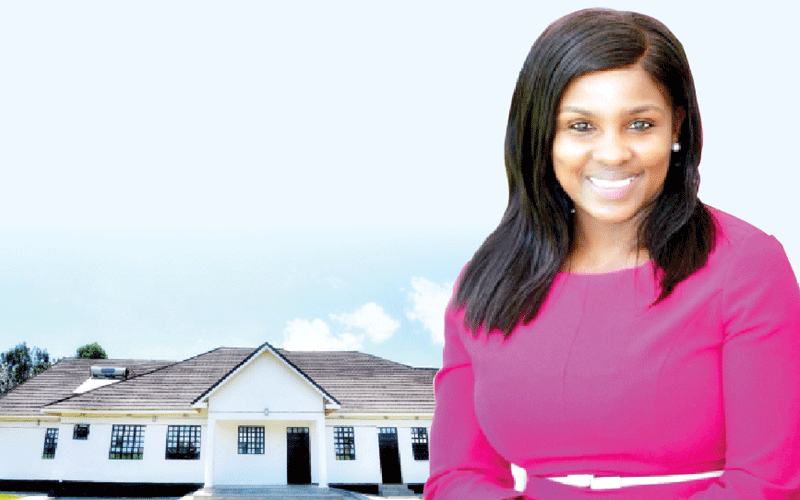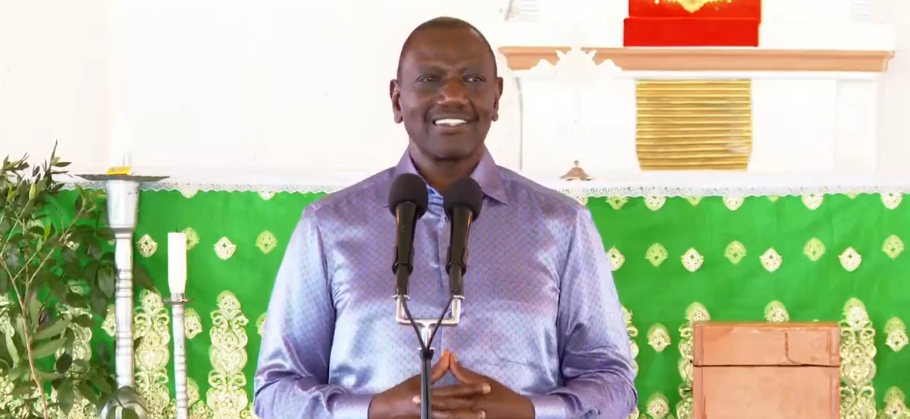Why I built a Sh30m house for my mother, says Michelle

Michelle Boit vowed to take care of her parents once she got a job.
Harriet James @harriet86jim
Michelle Boit was looking forward to her 2008 graduation at Texas Tech University, USA, where she had been pursuing chemical engineering.
She couldn’t wait to see her parents on the big day. Unfortunately, her father was denied a visa and they agreed that once Michelle settled at work, he would visit her.
He passed away before this dream came true. This meant Michelle being the first born of three, had to step up and take care of the family.
“I had told myself that as soon as I finish school and find a job, I would take care of my parents. I didn’t want them to suffer in their old age,” says Michelle.
But her first goal was to build for her mum. Having secured a job in 2014 at Tallow Oil in Kenya and becoming the first African Petroleum engineer, Michelle began to think of ways of actualising her desire to settle her mother.
She requested her mother to draw a plan of the kind of house that she wanted and Michelle only upgraded what was sent to be a bit modern.
“She wanted a closed verandah, but since it was supposed to be a big house and was in her own compound, I did an open patio. I also made the rooms bigger,” she says.
Getting a reliable contractor wasn’t easy. She opted to work together with her mother to supervise the project.
“Being an engineer, I held my mother’s hands and told her that we would build the house together.
The arrangement was hectic as I would travel to and from Eldoret to ensure that everything went just right,” says Michelle.
Taking matters in her hands
Her mum and cousins would stay on site to supervise the process and send her photos of the work done each day.
Sometimes, even after finding the right fundis, they would end up not working as she desired and Michelle opted to buy the materials and just pay them for labour.
The construction halted in May 2018 when the family travelled to the US for Michelle’s graduation ceremony for her Master’s degree.
And when they came back, their mother became sick and was admitted in the intensive care unit.
Children responsibility?
“I stopped everything to look care of her. It was mentally, emotionally, physically and financially draining,” Michelle says.
She spent a whole month at the hospital. Even after her mother got better, she would still go for check-up, which required money.
It took seven months before the worked continued as Michelle also had to recover financially and emotionally.
And when it was all done, they did a thanksgiving ceremony, inviting the priest to bless the home before moving in August 1, this year.
Though some people felt that she wasted a lot of money and that she would have invested in rental apartments rather than a Sh30 million lavish house (nicknamed as White House), Michelle believes that she made the right choice.
“I built it as a legacy, for memories and for generations to come. I am also teaching my children to be independent as I don’t want to extremely rely on them financially when I’m old— maybe just their emotional support.
I want to break that cycle where the children have to take care of their parents as an obligation,” she says.
Caring for aging parents may be a top priority for many adult children.
“Some of our parents could not afford decent housing, while others sold everything valuable to see us through school and support us to responsible adulthood.
It is, therefore, good to think about rewarding parents when one gets at the ‘top’,” says Judy Odhiambo, a psychologist.
According to some experts, though African parents favoured sons more than daughters, saying that girls would eventually get married, girl children are more nurturing and tend to care more for their parents than their boy siblings.
“Girls will build a house for their parents if they had the resources, while boys will care about themselves first,” Odhiambo says.
Michelle is lucky to have a supportive husband who supported her through the entire process. Unlike other families where such actions would have caused a rift amongst the siblings, Michelle is also lucky that they were all helpful.
“Any contribution was welcome and is the same regardless of whether it’s Sh10 million or Sh1,000.
We agreed with my siblings that I will build the house while my sister who is a nurse, will furnish it. My younger brother’s work was to maintain the house,” she reveals.
“Women step in most of the time when their male siblings are missing in action.
But other women may face obstacles because (those who are married) are considered outsiders.
Though things are changing, the shame that your sister is building a home for your parents and the men are doing nothing still exists,” notes Dr Gladys Nyachieo, a sociologist.
However, Odhiambo says sometime it’s hard to break the cycle of poverty when all we do is continue looking backward.
“That’s why the cycle of poverty carries on with us in Africa. We are expected to correct parent’s failures and our children are expected to correct our failures.
Then it becomes a chain. It’s good that Michelle wants to break that chain in her family,” she notes.












